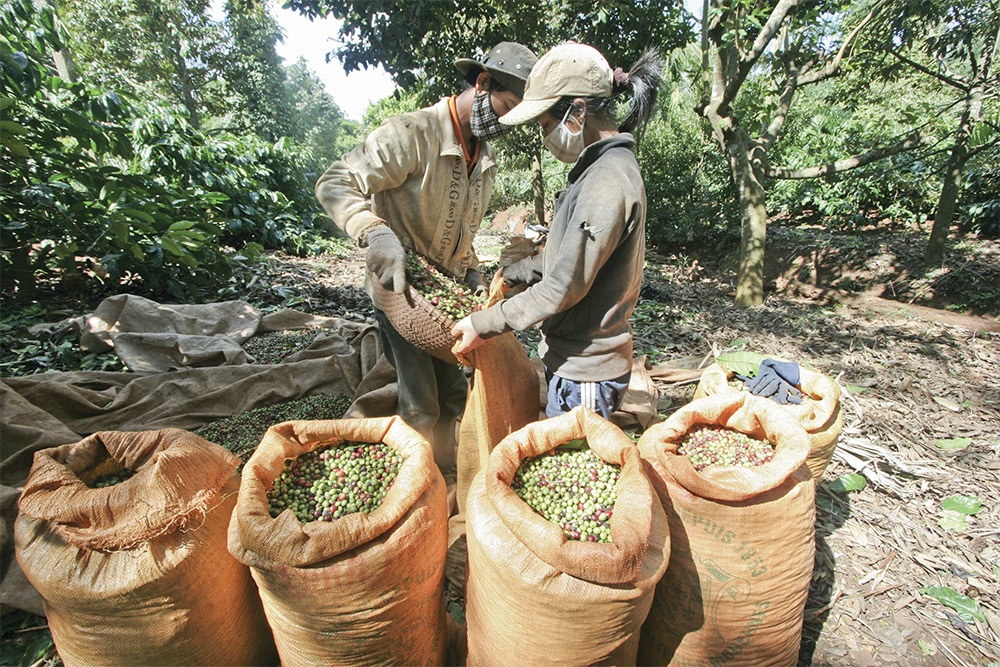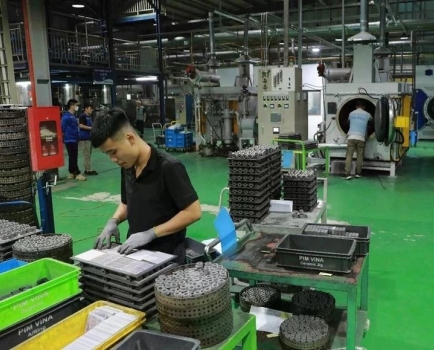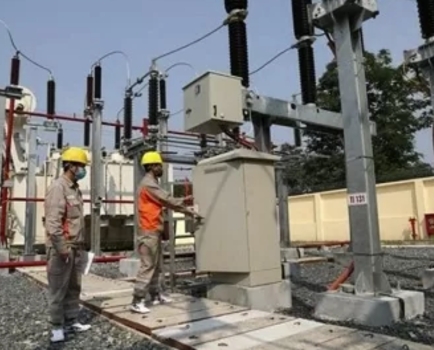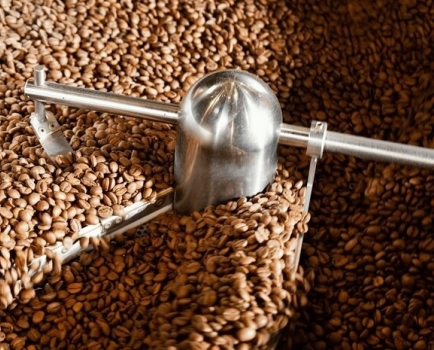Trade scope expands with British accession to CPTPP
Thu, 26 Dec 2024 15:21:00 | Print | Email Share:
Already fuelled by a bilateral free trade deal, trade and investment between Vietnam and the United Kingdom will be expanded following the Comprehensive and Progressive Agreement for Trans-Pacific Partnership’s entry into force with Britain.
| The UK and Vietnam have robust trade in some areas, but are looking to boost sectors such as agriculture, Photo: Le Toan |
On December 15, the Comprehensive and Progressive Agreement for Trans-Pacific Partnership (CPTPP) officially came into effect between the UK and eight ratified members, including Vietnam, and between the UK and Australia on December 24.
“As one of the world’s largest and most dynamic free trade agreements, the CPTPP presents significant opportunities for economic growth and enhanced collaboration among its member nations,” said a press release from the British Embassy on December 13.
According to the embassy, effective implementation of the partnership requires close collaboration between governments, the private sector, and trade associations to ensure the provisions – ranging from tariff reductions to rules of origin and digital trade facilitation - deliver maximum impact.
Iain Frew, British Ambassador to Vietnam, said, “The UK is committed to being a proactive and reliable partner in the CPTPP. We stand ready to support Vietnam’s ambitions for sustainable growth and innovation while promoting inclusive trade that benefits all. Moreover, we see Vietnam as a gateway to Southeast Asia and a key ally in addressing shared global challenges, such as climate change and economic resilience.”
The CPTPP is a free trade agreement signed by 11 countries in 2018, with entry into force seen that year for six nations. However, it was not until January 2019 that it became valid for Vietnam.
In July 2023, the CPTPP parties clinched an accession protocol with the UK, welcoming it as the 12th member.
Vietnam’s support
In July, Chairman of the National Assembly (NA) Tran Thanh Man signed the NA’s resolution on adopting the UK’s accession protocol to the CPTPP.
Under the resolution, the NA assigns the government to review all relevant legal documents to amend, supplement, or newly promulgate regulations so as to ensure the consistency of the Vietnamese country’s law system and ensure the right roadmap for the implementation of commitments in the UK’s protocol on access to the deal.
In late November, the Ministry of Justice established a council to appraise a draft decree amending and supplementing a number of articles on promulgating the Preferential Export Tariff and Special Preferential Import Tariff of Vietnam to implement the CPTPP for 2022-2027.
After joining the deal, the UK will enjoy the same incentives that Vietnam currently offers to member countries with an average tax rate of 1.8 per cent (including 87.6 per cent of tax lines being eliminated). Meanwhile, the UK will remove tariffs on 94.4 per cent of tax lines for Vietnamese goods.
According to the British Consulate in Ho Chi Minh City, the CPTPP is a modern and forward-looking trade agreement, with cutting-edge provisions in digital trade and e-commerce. The UK and Vietnam are increasingly working together to explore joint initiatives that promote innovation and digitalisation.
The UK and Vietnam have already enjoyed a robust trade and investment relationship over the past few decades.
The British Embassy to Vietnam calculated that bilateral trade has reached over £6.4 billion ($8.1 billion) in 2024, reflecting consistent growth despite global uncertainties. Key sectors such as agriculture, textiles, renewable energy, education, financial services, and technology underscore the complementary strengths of the UK and Vietnamese economies and the potential for deeper cooperation.
“The CPTPP represents a new chapter in this economic partnership, unlocking opportunities to strengthen trade, draw in investment, and deepen collaboration across a wide range of sectors,” the embassy stated. “For UK businesses, the agreement provides improved access to one of the fastest-growing economic regions globally. For Vietnam, it offers access to the UK’s cutting-edge expertise, innovation, and global networks while creating opportunities to diversify exports and attract high-quality investment.”
After the UK joins the CPTPP, all the member states will contribute 15 per cent of global GDP, equivalent to £12 trillion ($15.2 trillion), according to the Vietnamese Ministry of Industry and Trade.
It said that, along with joining the CPTPP, the UK has recognised Vietnam as a market economy. This will make it more favourable for Vietnam to avoid trade barriers, especially anti-dumping investigations. At the same time, Vietnam’s exports will not suffer from discrimination, and will be subject to more reasonable anti-dumping tax rates.
Vital partners
At present, the trade and investment cooperation between the two economies is largely driven by the UK-Vietnam Free Trade Agreement, which has brought about significant reductions in tariffs for both sides’ goods.
Total trade in goods in 2023 reached $5.92 billion, including Vietnam’s exports of $6.42 billion, up 88.5 per cent on-year, and imports of $799 million, up 87.6 per cent on-year.
In the first 10 months of this year, both sides’ total trade is estimated to have touched more than $7 billion, including nearly $6.4 billion worth of Vietnam’s goods exports – up 22 per cent on-year.
Under the CPTPP, tariff rates for UK imports have already dropped. Tariff rates on pork have dropped from 22-25 to 8.1 per cent, while tariffs on seafood have largely disappeared. Long-term advantages will continue to develop. Vietnam is expected to benefit from increased exports of agricultural and seafood produce, while the UK should see a boost to meat exports.
“As a member of the CPTPP, we see Vietnam as an important partner with a rapidly growing economy in the heart of the Asia-Pacific region (with growth of over 5 per cent in 2023 and is predicted to grow roughly 6 per cent in 2024). We are committed to continue to grow our trade relationship joining this high standards and forward-thinking trade bloc enables us to work with Vietnam and other CPTPP members to shape the trading systems of the future, for example in areas like digital trade,” said UK trade commissioner for Asia-Pacific Martin Kent.
According to Kent, overall, the combination of complementary economies, trade agreements, diversification of trade and investment, government support, and cultural connections contributes to the strong trading relationship between the UK and Vietnam.
“By leveraging these factors and continuing to strengthen their economic partnership, both countries can further enhance bilateral trade and unlock new opportunities for mutual prosperity and growth,” Kent added.
According to Vietnam’s Ministry of Planning and Investment, cumulatively as of late November 2024, UK investors had 585 valid ventures in Vietnam, registered at nearly $4.46 billion.
|
Prospects of Vietnam’s agricultural exports to the UK Although Vietnamese imports are currently just 1 per cent of the UK’s annual $700 billion imports, its high purchasing power and growing Vietnamese community in the UK, is the foundation for assured future growth. To date, the UK is Vietnam’s third-largest trading partner in Europe. Under the UK–Vietnam Free Trade Agreement (UKVFTA), 94 per cent of the 547 tariffs on Vietnamese vegetables, fruits and related products are eliminated. While plants and plant products imported from non-EU countries to Great Britain require strict import procedures, many Vietnamese popular fruits fall under the Unregulated Plants and Plant Products list. These items benefit from less burdensome import requirements, including pineapple, coconut, citrus, kumquat, orange, and persimmon. Seafood is also poised to be the second agri-food category that benefits most from the UKVFTA. The UK is currently one of the top 10 importers of catfish from Vietnam and under the deal, Vietnamese seafood products have become more competitive than those from China, Thailand, Malaysia, Indonesia, the Philippines, and India. Vietnam also holds the potential to emerge as a significant supplier of products to UK retailers. Processed products like coffee, cashews, and pepper are already widely available in major UK supermarkets, with cashews capturing an impressive 90 per cent market share. With the UK’s participation in the CPTPP, access to Vietnamese agricultural products will improve. In recent years, Vietnam’s agricultural sector has been transitioning towards reduced emissions, adopting organic processes, and harnessing renewable energy sources. These sustainability efforts will resonate with UK consumers who prioritise origin traceability, food safety, and environmentally friendly and ethically sourced goods. Finally, with the growing popularity of Vietnamese cuisine among the British, such as pho or banh mi, it is suggested that the Vietnamese government and exporters can do more to establish recognised brands and geographical indication protection for Vietnamese agri-food products, mirroring the successful entry of several UK food and beverage brands into Vietnam, such as Cadbury’s, and McVitie’s.Source: British Embassy to Vietnam |
By: Khoi Nguyen/ Vietnam Investment Review
Source: https://vir.com.vn/trade-scope-expands-with-british-accession-to-cptpp-120324.html
---------------------------------------------
Same category News :














